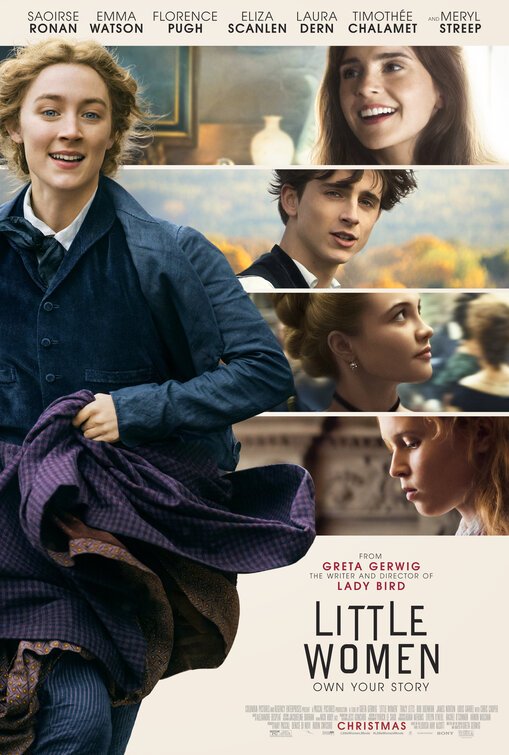“Gorgeous Historical Revisiting of LITTLE WOMEN”
What You Need To Know:
LITTLE WOMEN (2019) is the most gorgeous, historically accurate big screen version of the famous book by Louisa May Alcott that’s been made several times into movies and for television. The movie is a delightful character study about four sisters and their mother who have to deal with real issues during the Civil War. The movie opens with Jo trying to sell the articles she wrote in New York City, Aunt May taking Amy to Paris to learn how to paint, and the other activities of the four sisters who are the Little Women of the movie’s name.
Although it’s long, LITTLE WOMEN is a delightful movie filled with minor crises and family tensions that are resolved with prayer, compassion and love. The good triumphs, making the movie a delight. The filming is Oscar worthy, so is the direction and acting. Even hardhearted critics at the screening loved the movie despite its strong Christian faith content. LITTLE WOMEN is a picture of America and New England in the 1860s when it was a homogeneous society with a highly developed Christian culture that assumed faith and values.
Content:
Very strong Christian worldview with lots of prayer, overt commendations of Christmas, miraculously answered prayer, real dependence on God and His Grace, deep understanding of sanctification, church scenes, Christian funeral, Christian marriage, but as Dr. Peter Loback has pointed out in his book on George Washington, people didn’t use the name of Jesus often in that time, plus a strong appeal for women’s equality, which borders on feminism but is slightly transformed in a traditional direction at the end by one female character crying out for companionship and many acts of Christian charity
No foul language
No overt violence, although one of the sisters is dying from scarlet fever
No overt sex, but a few scenes of kissing where couples proceed toward marriage
No nudity
Alcohol use at parties but no drunkenness
No smoking or drugs; and,
Mild miscellaneous incidents of stubbornness, pride, willfulness, anger, but in the context of a beautiful domestic world.
More Detail:
The movie starts with a quote from Louisa May Alcott, saying, “I had a lot of troubles, so I write jolly tales.” The movie opens with Jo trying to sell the articles she wrote in New York City, Aunt May taking Amy to Paris to learn how to paint, and the other activities of the four sisters who are the Little Women of the movie’s name.
Then the movie cuts back and forth between the younger little women and the mature little women. Surprisingly, the plot with all these flashbacks is easy to follow because the directing and acting is superb.
Jo, the cerebral writer, a reflection of Louisa May Alcott, is being pursued by the very wealthy grandson of the next door neighbor, Theodore Laurence, whom she calls Teddy, but everyone else calls Laurie. Amy is young and beautiful but feels left out and gets so upset at one point that she burns the manuscript of Jo’s book that Jo worked so hard on and hidden. Beth is a beautiful pianist but eventually gets scarlet fever from trying to help a poor family, which forces everyone else to their knees. Meg, the other sister, has the talent to be a great actress, but she wants to grow up and get married. Marmee, the mother, is so concerned about others that she provides Christian charity to everyone, including Civil War survivors. In fact, at their Christmas breakfast, she convinces the girls to take their food to a poor family in town. The father is off as a chaplain in the Civil War. Laurie’s grandfather is a generous patriarch who gives a piano, a very expensive item, to the family.
These background strands flash forward to the consequences of several of their actions. For instance, Jo sells some of her articles to a publisher, but she refuses to put her name on them. Also, while living in New York, Jo has a paramour, Dr. Bhaer, who tells her that her articles are not good enough.
Their aunt is frustrated that the father became a poor pastor/chaplain and tries to convince each girl to marry someone rich. Jo doesn’t like this idea. She believes a woman should be able to make her own way into the world and she does make some money selling her articles
As one after another of the girls get married, Jo resists Laurie and wants to do everything on her own. The turning point is when Beth dies after Jo gives her incredible care. Before this, as an answer to prayer, Beth recovered for a long period of time. Jo approaches her publisher with her book titled, LITTLE WOMEN. His children love it, but he complains that you can’t have a woman as a hero if she doesn’t get married by the end of the book or at least die. She complains that this is a male perspective, but he says this is just good romance.
Although it’s long, LITTLE WOMEN is a delightful movie filled with minor crises and family tensions that are always resolved with prayer, compassion and family love. The good triumphs, making the movie a delight. Better yet, the filming is Oscar worthy, as is the direction and acting. Even hardhearted critics in the audience loved the movie in spite of its strong faith content. There’s no foul language but a lot of answered prayer and changed hearts. MOVIEGUIDE® commends LITTLE WOMEN and notes that the feminist tendencies are refuted at the end, but this is a picture of America and New England in the 1860s when it was a homogeneous society with a highly developed Christian culture that assumed faith and values.




